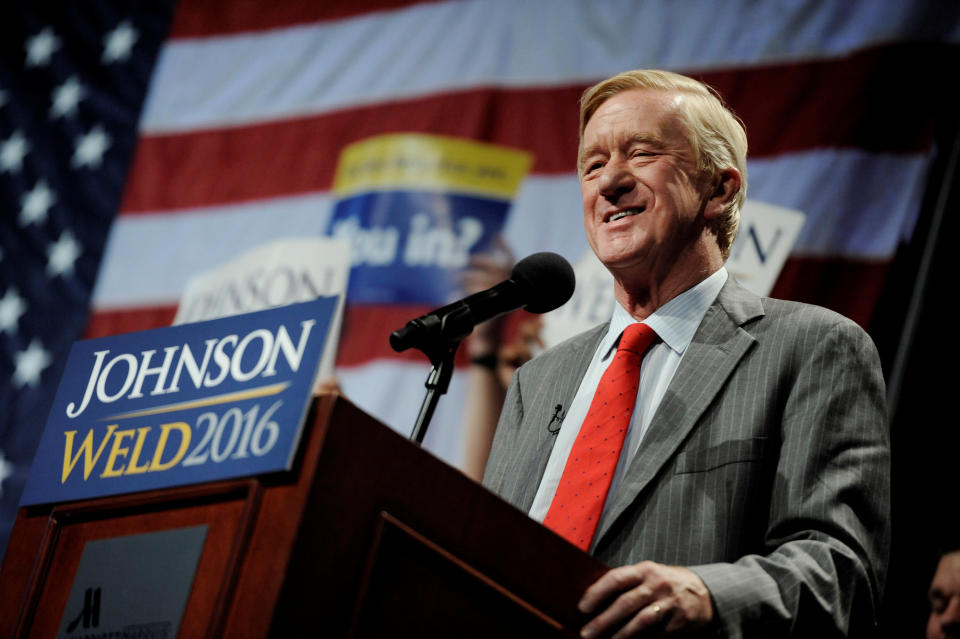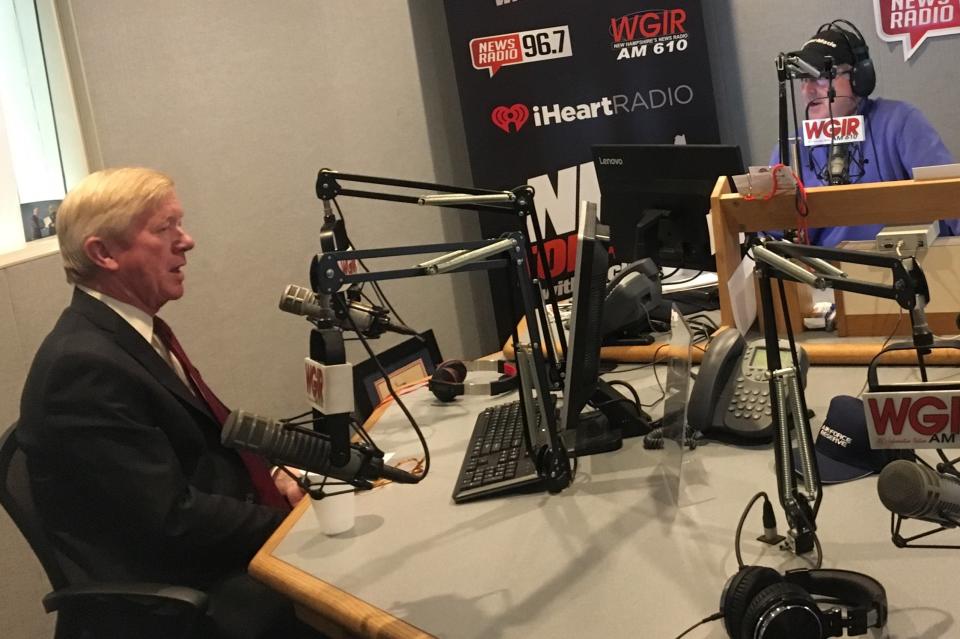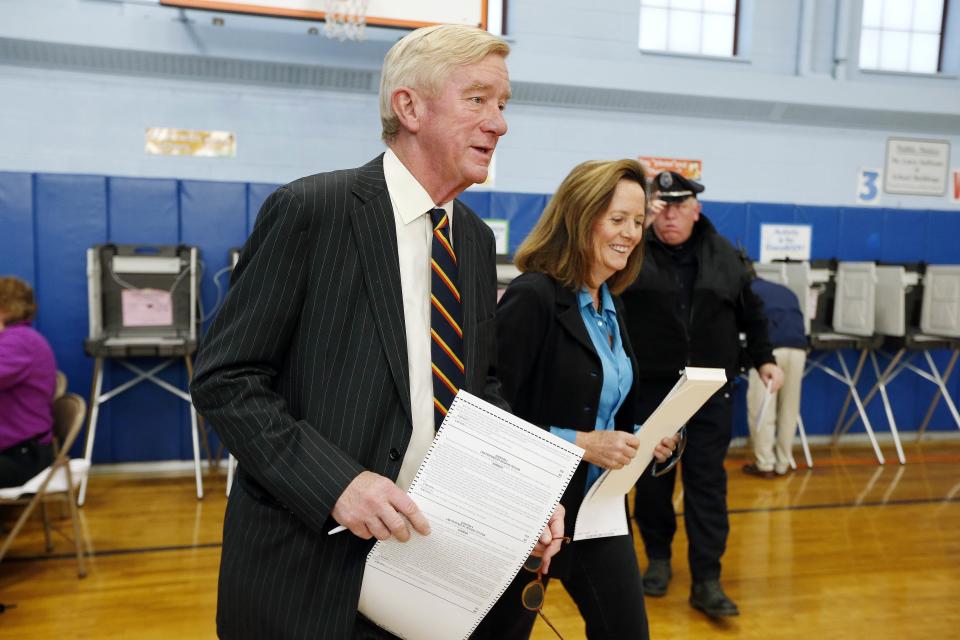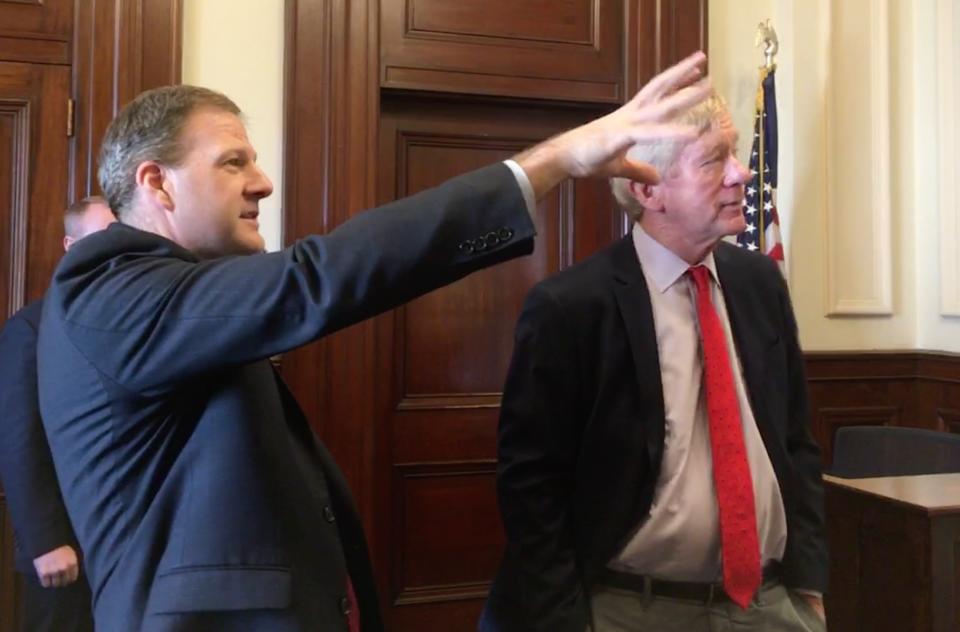Bill Weld Is Taking On The Trump Monster Because Some Republican Has To

CONCORD, N.H. — Bill Weld says he knows all about lousy odds.
In his first run for Massachusetts governor in 1990, he got trounced in the spring Republican state convention, 53-36. The margin was so big that the state party, under its rules, gave the winner its full endorsement heading into the primary. Weld says he made up for his poor showing by outworking the frontrunner, hitting every single meeting of Republicans in the Bay State he could find.
“I had nothing to do but go to events all summer long,” he recalls. “I would have gone to the opening of an envelope if an envelope were being opened.”
He wound up winning the September primary, and then, two months later, the governorship.
“I don’t mind uphill.” Weld is sitting on a stool at a recent taping of the “Politics and Pints” radio show across the street from the gold-domed statehouse in Concord. One of the three hosts has pointed out the nature of his latest campaign. “I know uphill.”
Of course, 29 years ago, he was running against a state legislator. This time, he is taking on the sitting president of the United States in the primaries — something that has never ended successfully for the challenger. Ronald Reagan came the closest in 1976, trying to win the nomination from incumbent Republican Gerald Ford. Democrat Ted Kennedy’s effort in 1980 did not come nearly as close to unseating Jimmy Carter.
Weld, though, may have a different model in mind: Pat Buchanan, whose New Hampshire-centric campaign in the weeks leading up to that state’s primary in 1992 won him 37 percent of the state’s Republican voters against incumbent George H.W. Bush.
Weld was at Bush headquarters that night, having accompanied him around New Hampshire the previous week. “The young Bush aides were just crestfallen that Buchanan had gotten over 30 percent, and they were walking around with long faces. And I had to grab the mic back from them and declare, ‘Well, this is a resounding victory for the president. We’re well pleased with this. This is outstanding. On to November,’” he recalls, crediting his high school and college experience in theater. “Because none of them were in a mood to say that. They weren’t that good an actor. They hadn’t spent eight years on the stage.”
While Bush still won by 15 points, Buchanan’s showing stunned the political world — weakening the incumbent, drawing in independent candidate Ross Perot and likely leading to the election of Democrat Bill Clinton that November.
Weld denies that he is running merely to sabotage Trump’s re-election. He explains repeatedly — in interviews, in panel discussions, to a domestic violence workshop — that he is running for president in order to be president.
“You run to win until you don’t win,” he says.
Whatever Weld’s motivation, if Trump can be beaten anywhere — or at least, humiliated — New Hampshire seems to be the likeliest place. Open primaries, rebellious voters and Trump’s continuing weakness in the polls may let Weld perform unexpectedly well — putting Trump on the defensive at the very start of the primary season.
“This should be good ground for my overall message,” Weld says. “Which is: We’re all in this together.”
In another era, in an alternative timeline of the Republican Party, William Floyd Weld might have been a dream presidential candidate.
Among his first jobs after law school was with the House committee investigating Watergate. Seven years later, at age 36, Reagan appointed him the United States attorney for Massachusetts. After two years in that job, he moved to Washington, D.C., and took charge of the Justice Department’s entire criminal division. In 1990, back in Boston, he ran an unlikely race for governor in a solidly Democratic state and won — becoming the first Republican chief executive in 16 years. Four years later, he won reelection with 71 percent of the vote.
He served only half of that term after deciding to take on Democratic Sen. John Kerry in 1996, but he came up six points short in the Senate race and accepted a nomination from then-President Bill Clinton to be ambassador to Mexico. Nonetheless, Weld’s popularity in the governor’s office with his economically conservative but socially moderate, even liberal, policies helped usher in an era in which Republicans have held the top job in the state for 21 of the past 29 years.
Weld says he briefly considered running for the Republican presidential nomination in 1996 but ultimately chose to run for the Senate seat instead. He remained out of politics following that loss to Kerry, until he joined former New Mexico Gov. Gary Johnson’s presidential ticket in 2016 as a Libertarian.

Today, at age 73, Weld says he remains a conservative when it comes to spending and taxes. He says he would cut taxes even beyond where Republicans have cut them during the George W. Bush and Trump presidencies but would do so only after cutting spending first.
Yet even to conservative audiences, Weld speaks about his commitment to inclusion of racial minorities and the LGBT community. At a meeting with advocates for domestic violence victims, he explains how, as governor, he forced judges to undergo training so abused women would no longer have to hear “what did you do to annoy your husband or boyfriend” from the bench. He takes credit for having introduced “battered women’s syndrome” into case law in Massachusetts and for having commuted the sentences of eight women sent to prison for killing abusive partners.
“He really has been a leader in elevating victims’ voices,” says Lyn Schollett, director of the New Hampshire Coalition Against Domestic and Sexual Violence. Weld, she adds, strikes a favorable contrast with the sitting president, whom more than 20 women have accused of sexual misconduct, including sexual assault — and who was even caught on tape bragging that his celebrity allowed him to get away it. “When we see offenders getting away with this behavior, we see it being normalized,” Schollett says.
That contrast, in fact, is a key feature of the Weld story, never more than a minute or two in from the start of his remarks.
On Trump’s fitness for the job: “Basically, for his career, he was a New York and Palm Beach socialite who spent his time judging beauty contests, and that’s not preparation for being in the Oval Office. It’s almost small wonder that he would say, ‘Oh, yeah, you tell women you’re a star, you can grab ‘em anywhere you want.’ Well, we don’t need to put up with that in the Oval Office.”
About Trump’s attacks on NATO and traditional Western European allies: “Vladimir Putin, in his wildest dreams, never could have imagined an American president saying something like that.”
On Trump’s admiration for the dictators like Putin in Russia or Kim Jong Un in North Korea: “It’s no secret that he’s kind of cozied up to the foreign leaders who are despots and autocratic, and I hope that’s not a prelude to trying to import that kind of government into the United States. Sometimes it seems like it is.”
But what seems to anger Weld the most about Trump are the casual attacks on minority groups and foreigners — what he calls Trump’s “immigration jihad,” starting with Mexicans, moving on to Muslims and Central American asylum-seekers: “There’s always somebody that’s guilty of threatening the purity of the United States.”
Over ice tea at a Concord eatery, Weld goes even further, making it clear that he’s not impressed by Trump’s attempts to call his views “nationalist.”
“Patriotism is when you have a love of your own people and your own country. Nationalism is when hatred of other peoples predominates,” Weld says, pointing out that the word was actually in the name of Hitler’s Nazi party. “Sounds to me like the National Workers Party of Germany in the ’30s: Nationalsozialistische Arbeiterpartei. Same word. Nationalist.”

As he walks down Concord’s Main Street one recent afternoon accompanied by longtime friend and New Hampshire Republican National Committeeman Steve Duprey, Weld’s years as leader of a neighboring state work in his favor.
“Hello, governor,” greets a woman loading up her Suburu. “Good to see you.”
But his most enthusiastic response comes from those who dislike Trump the most — which is to say, Democrats.
“He needs a challenger,” says Dan Delphonse as he pumps Weld’s hand in a florist shop. “He needs to be beat.”
The 68-year-old retiree says that he voted for Hillary Clinton in the 2016 primary, but that he will be asking for the other ballot come primary day next February. “I’m a lifelong Democrat who’s going to vote Republican.”
Eric Gallager, 28, says he voted for Bernie Sanders in 2016, but that he, too, plans to vote in the GOP primary so as to rid the nation of Trump sooner. “I think the psychological effect of him being beaten in a primary would be so much greater.”
Such crossover voting is relatively easy in New Hampshire, which permits temporary registration with a party for independent voters right on Election Day. After a pizza lunch with a handful of University of New Hampshire students in Durham, Weld encourages them to vote in the GOP primary if they truly want to get rid of Trump.
“The contest is going to be in the Republican primary,” he says. “Make a difference.”
Pollsters are skeptical that many true Democrats will do that, particularly with the likelihood of so many candidates campaigning hard to win New Hampshire on the Democratic ballot.
“I doubt that’s going to happen too much,” says Neil Levesque, head of polling at Saint Anselm College in Manchester. In fact, the Republican primary might be even more Republican than usual. “A lot of independents will want to play in the Democratic primary.”
Levesque acknowledges that a fair number of New Hampshire Republicans nonetheless seem to welcome a primary challenge to Trump – 51 percent, in a recent survey. “It was sort of an anomaly.”
What Levesque calls an “anomaly,” Weld sees as an opening.
He sees big opportunities with “Weld-friendly” groups, including younger voters and suburban women who traditionally voted Republican but broke for Democrats in last year’s midterms. “My task here, frankly, is to enlarge the electorate,” he says. “They deserve a choice.”
Love HuffPost? Become a founding member of HuffPost Plus today.

At the “Politics and Pints” taping, a host compliments Weld for having visited the state almost every week since announcing his exploratory committee. Weld quickly corrects him: “Every week. No almost about it.”
True, Weld lives just over an hour away in Canton, Massachusetts, but his level of commitment to a campaign thus far exceeds that of the two other Republicans considering primary runs. Maryland Gov. Larry Hogan is scheduled to visit Manchester in late April, while former Ohio Gov. John Kasich is expected to decide later this year.
Weld says he welcomes one or both to the race. “If all three of us are in there, and one pulls away from the other two, then maybe that person is a giant killer,” Weld says. “It might give that person a better shot at winning primaries against the president.”
That type of collaboration was absent in 2015. Instead, 16 Republicans, a roster of sitting and former governors and senators, savaged each other but left Trump largely untouched — assuming he would either self-destruct or be an easy opponent once the field had narrowed to one or two alternatives.
That allowed Trump to effectively nail down the nomination despite having won barely one-third of the ballots cast in Republican primaries and caucuses.
Weld concedes that if there were a President Jeb Bush or a President Marco Rubio or a President Chris Christie today, he would not be spending long days on the campaign trail. He further allows that even a President Hillary Clinton would not have made him open an exploratory committee, as he did last month. “It would not have occurred to me.”
He is careful not to take the next step, which is to say that anyone, even one of the many Democrats currently running, would be a better president than Trump. “I’m not endorsing any Democrats at this point,” he laughs.
Yet a small but significant number of “Never Trump” Republicans around the country did exactly that in 2016 and continue to do so today, including a number of Weld’s supporters.
Among those openly and vociferously critical of Trump is Fergus Cullen, a former chairman of the New Hampshire Republican party who is hosting a “house party” for Weld on Sunday to meet and, perhaps, collect checks from potential supporters in the Portsmouth area.
Cullen acknowledges that Republicans like him make up a small percentage of the electorate, but says it’s a critical percentage nevertheless. “We can prevent Republicans from winning elections. It’s a key group,” he says, adding that other GOP officeholders hoping to win reelection next year — including Lindsey Graham in South Carolina and Martha McSally in Arizona ― need to think twice about tying their fates to Trump’s. “By the way, Senator Graham? He’s going to take you down with him. Senator McSally? He’s going to take you down with him.”
The continued resistance to Trump and “Trumpism,” Cullen adds, is necessary if the Republican Party ever wants to move past its current role as a personality cult. “Why are we still fighting?” he says. “We want to be around to put the pieces back together whenever this is over.”

This article originally appeared on HuffPost.

